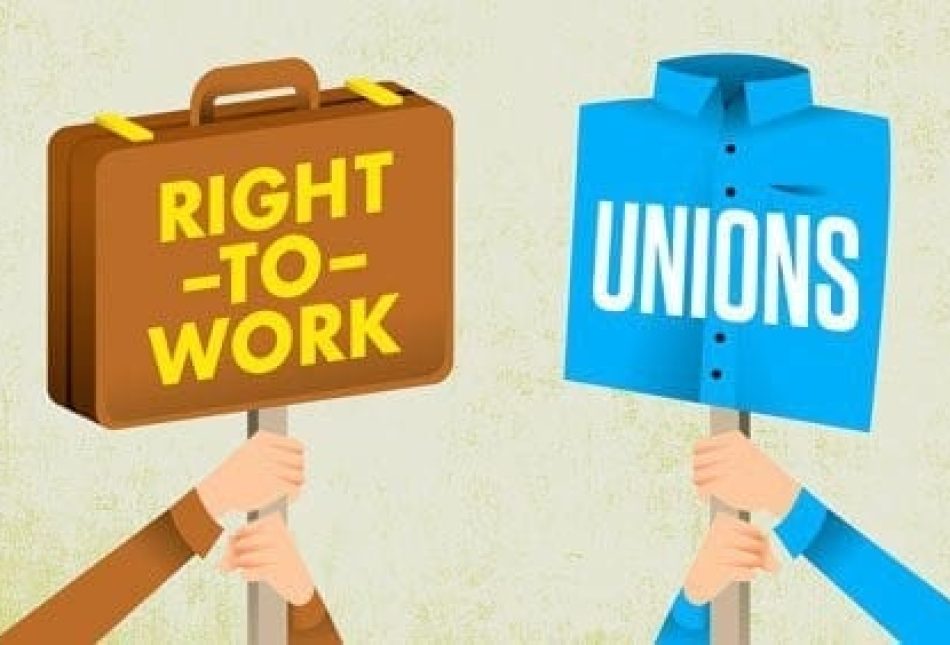Failure of local right-to-work measures unfortunate, unsurprising


The following article appeared in The Hill on April 27, 2019.
In the space of one month, the governors of New Mexico and Illinois ratcheted back worker freedom and local control in their states. On March 27, New Mexico Gov. Michelle Lujan Grisham, a Democrat, signed a bill prohibiting local counties and cities from allowing workers to choose whether they had to pay a union just to keep their jobs. On April 12, Democratic Gov. J. B. Pritzker of Illinois signed a similar bill.
With Democrats replacing Republicans in the governors’ mansions in those two blue states, policy was bound to change rather dramatically.
Among the top priorities of ascendant progressive political leaders in both states in 2019 is the passage of laws banning local governments from enacting right-to-work laws. In both states, local governments had adopted such laws in recent years, only to have those laws quashed by political allies of big labor when they took office.
Right-to-work simply means a union cannot get a worker fired for not paying its union dues.
Local elected officials in 10 New Mexico counties and in Lincolnshire Township in Illinois felt emboldened to adopt right-to-work laws, thanks to the example of Kentucky, where counties have adopted such laws. Their actions were a prelude to the Bluegrass State coming under total Republican rule in the 2016 election and Gov. Matt Bevin signing a statewide right-to-work law shortly after taking office in 2017.
Unfortunately, Democratic governors this year replaced the Republicans in place in Illinois and New Mexico, and now will work with Democrats in their legislatures to overturn local right-to-work ordinances.
While New Mexico and Illinois are very different in some ways, they face similar problems: poor economic policy environments and stagnant economies relative to their neighbors. Any comparison of New Mexico with its economically freer (albeit not always red-state) neighbors shows that something is wrong there.
One recent report, “Rich States/Poor States,” produced by the American Legislative Exchange Council, ranks New Mexico’s economic performance over the past decade as 47th overall, with cumulative gross domestic product (GDP) growth 46th in the nation and non-farm payroll employment growth at 48th in the nation.
Considering New Mexico’s motto, “Land of Enchantment,” and its prime location in the fast-growing American Southwest, this performance is abysmal.
Every neighboring state consistently outperformed New Mexico; Arizona, Utah, Texas, Colorado and Oklahoma are among the top states in the nation for economic performance during the past decade. New Mexico could, and should, be among the fastest-growing states, but its poor economic policies hold it back. Local governments outside progressive cities such as Albuquerque, Santa Fe and Las Cruces tried to break free from those policies, taking the local approach to economic reform, but they were quickly shut down.
Illinois is in much the same situation. While no one will confuse Rust Belt Illinois for New Mexico, the “Land of Lincoln” ranked 46th according to the ALEC index for economic performance over the past decade. The state’s cumulative GDP growth from 2007-2017 ranked 34th, and non-farm payroll growth ranked 41st. But like New Mexico, Illinois trails behind its faster-growing (and with the exception of Missouri), right-to-work neighbors.
Both New Mexico and Illinois are, in other words, blue islands of economic unfreedom within their respective geographic areas. New Mexico — with an economy driven almost entirely by resource extraction (mostly oil production) and the myriad federal installations located there — also happens to be in the relatively libertarian American Southwest. It is notably worse off than its neighbors on nearly all economic and even social indicators (such as crime and education).
Pushing for free-market policy change in deep blue states is hard. With Americans increasingly sorting themselves into states that already reflect their values, it appears that New Mexico and Illinois face the prospect of worsening public policy in the near term. Something has to give. We just don’t know what will happen and when.
Paul J. Gessing is the president of New Mexico’s Rio Grande Foundation, an independent, nonpartisan, tax-exempt research and educational organization that promotes the principles of limited government, economic freedom and individual responsibility. Follow him on Twitter @pgessing.
